英语语法汇总
英语语法大全汇总
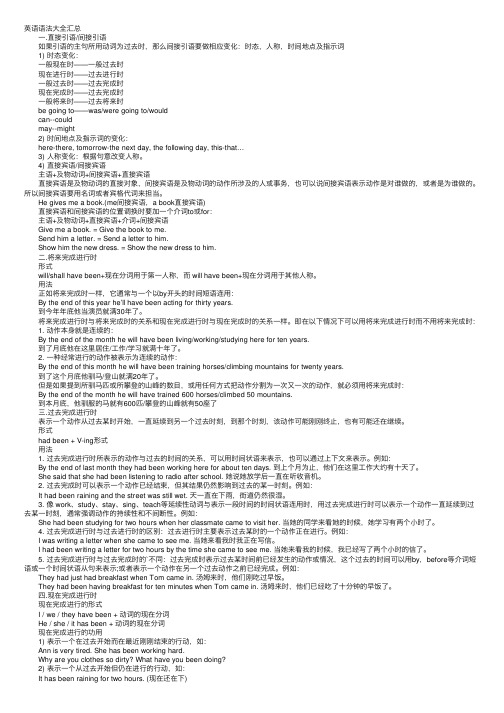
英语语法⼤全汇总 ⼀.直接引语/间接引语 如果引语的主句所⽤动词为过去时,那么间接引语要做相应变化:时态,⼈称,时间地点及指⽰词 1) 时态变化: ⼀般现在时——⼀般过去时 现在进⾏时——过去进⾏时 ⼀般过去时——过去完成时 现在完成时——过去完成时 ⼀般将来时——过去将来时 be going to——was/were going to/would can--could may--might 2) 时间地点及指⽰词的变化: here-there, tomorrow-the next day, the following day, this-that… 3) ⼈称变化:根据句意改变⼈称。
4) 直接宾语/间接宾语 主语+及物动词+间接宾语+直接宾语 直接宾语是及物动词的直接对象,间接宾语是及物动词的动作所涉及的⼈或事务,也可以说间接宾语表⽰动作是对谁做的,或者是为谁做的。
所以间接宾语要⽤名词或者宾格代词来担当。
He gives me a book.(me间接宾语,a book直接宾语) 直接宾语和间接宾语的位置调换时要加⼀个介词to或for: 主语+及物动词+直接宾语+介词+间接宾语 Give me a book. = Give the book to me. Send him a letter. = Send a letter to him. Show him the new dress. = Show the new dress to him. ⼆.将来完成进⾏时 形式 will/shall have been+现在分词⽤于第⼀⼈称,⽽ will have been+现在分词⽤于其他⼈称。
⽤法 正如将来完成时⼀样,它通常与⼀个以by开头的时间短语连⽤: By the end of this year he’ll have been acting for thirty years. 到今年年底他当演员就满30年了。
小学英语语法大全打印版
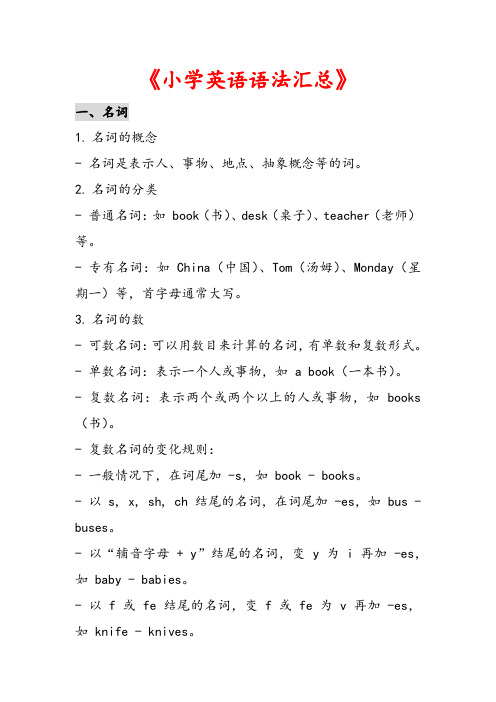
《小学英语语法汇总》一、名词1.名词的概念- 名词是表示人、事物、地点、抽象概念等的词。
2.名词的分类- 普通名词:如 book(书)、desk(桌子)、teacher(老师)等。
- 专有名词:如 China(中国)、Tom(汤姆)、Monday(星期一)等,首字母通常大写。
3.名词的数- 可数名词:可以用数目来计算的名词,有单数和复数形式。
- 单数名词:表示一个人或事物,如 a book(一本书)。
- 复数名词:表示两个或两个以上的人或事物,如 books (书)。
- 复数名词的变化规则:- 一般情况下,在词尾加 -s,如 book - books。
- 以 s, x, sh, ch 结尾的名词,在词尾加 -es,如 bus - buses。
- 以“辅音字母 + y”结尾的名词,变 y 为 i 再加 -es,如 baby - babies。
- 以 f 或 fe 结尾的名词,变 f 或 fe 为 v 再加 -es,如 knife - knives。
- 不可数名词:不能用数目来计算的名词,如 water(水)、milk(牛奶)、rice(米饭)等。
不可数名词没有复数形式。
4.名词的所有格- 表示所属关系,有两种形式:- ’s 所有格:一般用于有生命的名词后,如 Tom’s book (汤姆的书)。
- of 所有格:一般用于无生命的名词后,如 the door of the classroom(教室的门)。
二、代词1.代词的概念- 代词是用来代替名词或名词短语的词。
2.代词的分类- 人称代词:表示“我”“你”“他”“她”“它”“我们”“你们”“他们”等的词。
- 主格:I(我)、you(你;你们)、he(他)、she(她)、it(它)、we(我们)、they(他们),在句子中作主语。
- 宾格:me(我)、you(你;你们)、him(他)、her(她)、it(它)、us(我们)、them(他们),在句子中作宾语。
初二英语常用语法汇总及解析
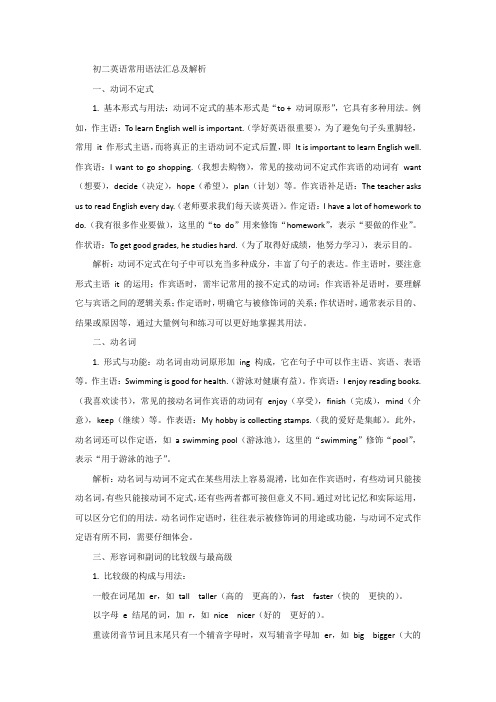
初二英语常用语法汇总及解析一、动词不定式1. 基本形式与用法:动词不定式的基本形式是“to + 动词原形”,它具有多种用法。
例如,作主语:To learn English well is important.(学好英语很重要),为了避免句子头重脚轻,常用it 作形式主语,而将真正的主语动词不定式后置,即It is important to learn English well. 作宾语:I want to go shopping.(我想去购物),常见的接动词不定式作宾语的动词有want (想要),decide(决定),hope(希望),plan(计划)等。
作宾语补足语:The teacher asks us to read English every day.(老师要求我们每天读英语)。
作定语:I have a lot of homework to do.(我有很多作业要做),这里的“to do”用来修饰“homework”,表示“要做的作业”。
作状语:To get good grades, he studies hard.(为了取得好成绩,他努力学习),表示目的。
解析:动词不定式在句子中可以充当多种成分,丰富了句子的表达。
作主语时,要注意形式主语it 的运用;作宾语时,需牢记常用的接不定式的动词;作宾语补足语时,要理解它与宾语之间的逻辑关系;作定语时,明确它与被修饰词的关系;作状语时,通常表示目的、结果或原因等,通过大量例句和练习可以更好地掌握其用法。
二、动名词1. 形式与功能:动名词由动词原形加ing 构成,它在句子中可以作主语、宾语、表语等。
作主语:Swimming is good for health.(游泳对健康有益)。
作宾语:I enjoy reading books.(我喜欢读书),常见的接动名词作宾语的动词有enjoy(享受),finish(完成),mind(介意),keep(继续)等。
英语专升本语法知识点汇总

英语专升本语法知识点汇总一、时态。
1. 一般现在时。
- 用法:- 表示经常或习惯性的动作或存在的状态。
例如:I go to school by bike every day.(我每天骑自行车去上学。
)- 表示客观事实或普遍真理。
例如:The earth moves around the sun.(地球绕着太阳转。
)- 结构:- 主语为第三人称单数(he/she/it等)时,动词要加 -s或 -es,如He likes reading. 其他人称用动词原形,如I like reading.2. 一般过去时。
- 用法:- 表示过去某个时间发生的动作或存在的状态。
例如:I visited my grandparents last weekend.(我上周末去看望了我的祖父母。
)- 结构:- 动词一般用过去式形式。
规则动词的过去式一般在词尾加 -ed,如work - worked;不规则动词有其特殊的过去式形式,如go - went。
3. 一般将来时。
- 用法:- 表示将来某个时间要发生的动作或存在的状态。
例如:I will go to Beijing next month.(我下个月将去北京。
)- 结构:- 常见的结构有will+动词原形,be going to+动词原形(表示计划、打算做某事或有迹象表明即将发生某事)。
如He is going to have a party tonight.(他今晚打算举办一个聚会。
)4. 现在进行时。
- 用法:- 表示现在正在进行的动作或存在的状态。
例如:She is reading a book now.(她现在正在读一本书。
)- 结构:- be动词(am/is/are)+动词的 -ing形式。
5. 过去进行时。
- 用法:- 表示过去某个时刻或某段时间正在进行的动作。
例如:I was watching TV at 8 o'clock last night.(昨晚8点我正在看电视。
英语语法知识大全汇总

英语语法知识大全汇总英语的重点主要在词汇,语法、阅读理解、作文……等等,其中语法是让大家一直比较头疼的知识点,下面给大家带来一些关于英语语法知识大全汇总,希望对大家有所帮助。
1.英语语法指的是什么英语语法是针对英语语言进行研究后,系统地总结归纳出来的一系列语言规则。
英语语法的精髓在于掌握语言的使用。
英语语法包括词语、时态、语态、语气、句子成分、句型结构等。
1.一般现在时:表示现在的状态、经常的或习惯性的动作、主语具备的性格和能力等。
基本结构:主语+be/do+其他。
2.一般过去时:表示过去某个时间内(或某一段时间内)发生的动作或存在的状态,过去经常或反复发生的动作。
基本结构:主语+动词的过去式或be的过去式+名词。
3.一般将来时:表示将要发生的动作、打算、计划或准备做某事。
基本结构:主语+am/is/are+going to + do sth;主语+will/shall+do sth4.一般过去将来时:立足于过去某一时刻,从过去看将来,常用于宾语从句中。
基本结构:主语+was/were+going to+do+其它;主语+would/should+do+其它。
5.现在进行时:表示现在(说话时)或当前阶段正在进行或发生的动作。
基本结构:主语+be+doing+其它。
6.过去进行时:表示过去某段时间或某一时刻正在发生或进行的行为或动作。
基本结构:主语+was/were+doing+其它。
7.将来进行时:表示将来某一时间正在进行的动作,或表示要在将来某一时间开始,并继续下去的动作。
常用来表示询问、请求等。
基本结构:主语+shall/will+be+现在分词+其它。
8.过去将来进行时:表示就过去某一时间而言,将来某一时刻或某一段时间正在进行的动作,主要用于宾语从句中,尤其多用于间接引语中。
基本结构:should/would+be+现在分词。
9.现在完成时:过去发生或已经完成的动作对现在造成的影响或结果,或从过去已经开始,持续到现在的动作或状态。
英语语法汇总及归纳

英语语法汇总及归纳一、词类1. 名词:表示人、事物、地点或抽象概念的名称。
例如:book,desk,person,dream。
2. 动词:表示动作或状态。
例如:run,talk,sleep,study。
3. 形容词:描述名词的性质或特征。
例如:red,happy,beautiful。
4. 副词:描述动词的方式或位置。
例如:quickly,happily,here。
5. 代词:代替名词或名词短语。
例如:I,you,it,they。
6. 冠词:限制名词,表明其泛指或特指。
例如:a/an,the。
7. 数词:表示数量或顺序。
例如:one,two,three,first,second。
8. 介词:表示名词与动词之间的关系。
例如:in,on,at,from。
9. 连词:连接两个句子或从句。
例如:and,or,but,that。
10. 感叹词:表示强烈的感情或感叹。
例如:oh,wow,uh-oh。
二、时态1. 现在时:表示现在的动作或状态,形式包括原形、第三人称单数形式(动词+s/es)、现在分词(动词+ing)。
2. 过去时:表示过去的动作或状态,形式包括过去式(动词+ed)、过去分词(动词+ed)。
3. 现在完成时:表示过去的动作对现在造成的影响或持续到现在,形式为have/has+过去分词。
4. 过去完成时:表示过去的过去,形式为had+过去分词。
5. 进行时:表示正在进行的动作,形式为be动词+现在分词。
6. 完成时:表示已经完成的动作或状态,形式为have/has+过去分词。
7. 将来时:表示将来的动作或状态,形式包括will+动词原形、be going to+动词原形、be动词+动词ing。
三、句子结构1. 主语+谓语:最基本的句子结构,表示一个基本的陈述。
2. 主语+谓语+宾语:表示一个动作有一个接受者。
3. 主语+谓语+间接宾语+直接宾语:表示一个动作有两个接受者。
4. 主语+谓语+宾语+宾补:表示一个动作有一个接受者,并且对其进行补充说明。
英语语法知识大全汇总

英语语法知识大全汇总一、词汇分类1. 名词:表示人、事物、地点、概念等。
如:man,book,China,happiness。
2. 动词:表示动作或状态。
如:run,read,be,become。
3. 形容词:表示事物的性质、特征、状态等。
如:big,small,happy,sad。
4. 副词:表示程度、地点、时间等。
如:very,now,here,then。
5. 代词:替代名词,避免重复。
如:I,you,he,she,it,we,they。
6. 介词:表示名词、代词与其他词之间的关系。
如:in,on,under,behind。
7. 连词:连接词、短语或句子。
如:and,but,if,while。
8. 感叹词:表示情感或惊讶。
如:oh,ah,oo,yeah。
二、句子结构1. 句子成分:主语、谓语、宾语、定语、状语、补语。
2. 句子类型:陈述句、疑问句、否定句、祈使句、感叹句。
3. 句子结构:简单句、并列句、复合句(包括主从句、宾语从句、定语从句、状语从句)。
三、时态1. 一般现在时:表示现在的习惯、事实、一般情况。
如:I study English every day.2. 一般过去时:表示过去某个时间的动作或状态。
如:I studied English yesterday.3. 一般将来时:表示将来某个时间的动作或状态。
如:I will study English tomorrow.4. 现在进行时:表示现在正在进行的动作。
如:I am studying English now.5. 过去进行时:表示过去某个时间正在进行的动作。
如:I was studying English at 8 o'clock last night.6. 将来进行时:表示将来某个时间将要进行的动作。
如:I will be studying English at 8 o'clock tomorrow.7. 现在完成时:表示过去发生的动作对现在的影响或结果。
英语语法大全(279个语法点汇总)

英语语法大全共279个语法,一天背一个。
先收藏吧!(see、hear、notice、find、feel、listen to、look at(感官动词)+do Eg:I like watching monkeys jump(比较级and 比较级)表示越来越怎么样a piece of cake=easy 小菜一碟(容易)agree with sb. 赞成某人all kinds of 各种各样 a kind of 一样all over the world=the whole world 整个世界along with 同……一道,伴随……Eg:I will go along with you我将和你一起去,The students planted trees along with their teachers学生同老师们一起种树。
as soon as 一……就……as you can see 你是知道的求助;向……要……(直接接想要的东西)ask for …… ask sb. for sth.向某人要什么Eg:Ask you for my book向你要我的书ask sb. to do sth. 询问某人某事;ask sb. not to do 叫某人不要做某事at the age of 在……岁时;Eg:I am sixteen I am at the age of sixteen.的起初;……的开始at the beginning of ………at the end of +地点/+时间最后;尽头;末尾Eg:At the end of the dayat this time of year 在每年的这个时候be/feel confident of sth./that clause+从句感觉/对什么有信心,自信Eg:I am /feel confident of my spoken English I feel that I can pass the test. be+doing 表:1 现在进行时 2 将来时be able to (+v.原)=can(+v.原)能够……Eg:She is able to sing She can sing.be able to do sth.能够干什么Eg:She is able to sing.be afraid to do (of sth.恐惧,害怕……)Eg:I'm afraed to go out at night;I'm afraid of dog.be allowed to do 被允许做什么Eg:I'm allowed to watch TV 我被允许看电视I should be allowed to watch TV 我应该被允许看电视be angry with sb.生某人的气Eg:Don't be angry with me.be angry with(at)sb. for doing sth. 为什么而生某人的气be as…原级…as 和什么一样Eg:She is tall as me.她和我一样高be ashamed tobe away from 远离be away from 从……离开be bad for对什么有害Eg:Reading books in the sun is bad for your eyes.在太阳下看书对你的眼睛不好。
英语语法知识点汇总

英语语法知识点汇总英语语法是学习英语的重要基础,掌握好语法能够帮助我们更准确、更流畅地表达自己的意思。
下面就为大家汇总一些常见且重要的英语语法知识点。
一、词性(一)名词名词是表示人、事物、地点或抽象概念的名称。
名词分为可数名词和不可数名词。
可数名词有单数和复数形式,如“book”(书,单数)和“books”(书,复数);不可数名词没有复数形式,如“water”(水)、“information”(信息)。
(二)动词动词表示动作或状态。
动词有时态、语态和语气的变化。
时态包括一般现在时、一般过去时、一般将来时、现在进行时、过去进行时、现在完成时、过去完成时等。
例如,“I play football every day”(一般现在时),“He played basketball yesterday”(一般过去时)。
(三)形容词形容词用来修饰名词或代词,描述人或事物的特征、性质。
如“beautiful”(美丽的)、“tall”(高的)。
(四)副词副词用来修饰动词、形容词、其他副词或整个句子,表示时间、地点、程度、方式等。
比如“quickly”(快速地)、“very”(非常)。
(五)代词代词是用来代替名词或名词短语的词。
分为人称代词(如“I”“you”“he”等)、物主代词(如“my”“your”“his”等)、指示代词(如“this”“that”“these”“those”等)、不定代词(如“some”“any”“many”等)等。
二、句子成分(一)主语主语是句子所要说的人或事物,通常是名词、代词或动名词短语。
例如,“The dog is cute”(“The dog”是主语)(二)谓语谓语说明主语的动作或状态,由动词担任。
如“He runs fast” (“runs”是谓语)(三)宾语宾语表示动作的对象,通常是名词、代词或动名词短语。
比如,“She reads a book”(“a book”是宾语)(四)定语定语用于修饰名词或代词。
英语语法汇总

英语语法汇总一、词类1. 名词:表示人、事物、地点或抽象概念的名称。
2. 代词:用来代替名词、数词、形容词、动词不定式、疑问词等。
3. 形容词:用来描述或修饰名词或代词,表示人或事物的特征或状态。
4. 副词:用来描述或修饰动词、形容词、其他副词或整个句子,表示时间、地点、程度、方式等概念。
5. 动词:表示动作或状态。
6. 数词:表示数目或顺序。
7. 冠词:用在名词前,帮助说明名词所指的人或事物。
8. 介词:表示名词之间的关系,说明事物所处的位置、时间、方式等。
9. 连词:用来连接词、短语、从句或句子,并表示它们之间的关系。
10. 感叹词:表示感情或情绪,如oh,ah等。
二、时态1. 现在时:表示现在发生的动作或存在的状态。
包括一般现在时、现在进行时、现在完成时和现在完成进行时。
2. 过去时:表示过去某个时间里发生的动作或存在的状态。
包括一般过去时、过去进行时、过去完成时和过去完成进行时。
3. 将来时:表示将来某个时间里将要发生的动作或存在的状态。
包括一般将来时、将来进行时、将来完成时和将来完成进行时。
三、语态1. 主动语态:表示主语是动作的执行者,即主语+谓语+宾语。
2. 被动语态:表示主语是动作的承受者,即主语+be动词+过去分词+(by+动作执行者)。
四、虚拟语气1. 现在虚拟语气:表示对现在或将来的假设,用动词原形表示,如if I were you,I would go there。
2. 过去虚拟语气:表示对过去的假设,用过去式表示,如if I had known the news,I would have told you。
五、从句类型1. 名词性从句:包括主语从句、宾语从句、表语从句和同位语从句,它们在句中起名词作用。
2. 定语从句:修饰名词或代词的从句,分为限制性定语从句和非限制性定语从句。
3. 状语从句:修饰动词、形容词、副词或整个句子的从句,表示时间、地点、原因、条件等概念。
英语语法学习方法技巧大总结(汇总4篇)

英语语法学习方法技巧大总结(汇总4篇)英语语法学习方法技巧大总结第1篇学生容易混淆的是全部倒装与部分倒装。
如何区分之,编个顺口溜:副(adv.)介(prep.) 提前全倒装,其它句式部分倒;否定提前倒助动,让步状语倒表语;复合句式倒主句,不A、Here comes the bus.(副词提前,全倒装)B、Here he comes.(代词作主语,不倒装)C、In front of the house lies a garden.(介词短语提前,全倒装)D、Never shall I do this again.(否定词提前,部分倒装)E、Young as he is ,he knows a lot.(让步状语从句,表语倒装)F、Only when he told me did I realize what trouble he was in.(only 修饰状语,主句倒装)G、Only he can save the patient.(only修饰主语.不倒装)H、Not only will help be given to people, but also medical treatment will be provided.(否定词提前,部分倒装)I、Not only he but also we like sports.(连接两个主语,不倒装)英语语法学习方法技巧大总结第2篇“非谓语动词”可分为动词不定式、动名词和分词。
它在句子中的作用很多:除了不作谓语外,它可以充当主语、宾语、表语、定语、状语与复合宾语(主语补语或宾语补语)。
有些及物动词后面接不带to的不定式作复合宾语。
这些动词归纳如下:一感(feel).二听(hear,listen to),三让(have,1et, make),四看(see,watch,notice,observe)。
再加上help somebody(to)do something和美国英语look at somebody do something。
英语语法知识点汇总(收藏版)

英语语法知识点汇总(收藏版)1.一般现在时态(一)I、we、you、they作主语,动词原形后面跟;否定句,更容易,动词前面加don t;疑问句,别着急,句首Do,来帮你,后面问号别忘记,肯定回答用Yes,I、we、you、they加上do;否定回答要用No,I、we、you、they加don t.2.一般现在时态(二)主语三单他、她、它,动三形式后面压,词尾一般s加;辅音字母+y型,变y为i,es;ch,sh真有趣,s,x,es;三个特殊那里去?has、goes和does;否定句,记住它,动词前面doesn t;疑问句,别着急,句首Does,来帮你;肯定回答用Yes,he、she、it加does;否定回答要用No,he、she、it、doesn t;Does、doesn t来帮你,后面动词定注意,恢复原形要切记。
3.be 的用法口诀我用am,你用are,is连着他,她,它;单数名词用is,复数名词全用are;变疑问,往前提,句末问号莫丢弃;变否定,更容易,be后not莫忘记;疑问否定任你变,句首大写莫迟疑。
4.时间名词前所用介词的速记歌年月周前要用in,日子前面却不行;遇到几号要用on,上午下午又是in;要说某日上下午,用on换in才能行;午夜黄昏须用at,黎明用它也不错;at也用在明分前,说差可要用上to。
说过只可使用past,多说多练牢牢记,莫让岁月空蹉跎。
5.动名词在句中的功能及其他动名语法其功能,名词特征有动形,主宾表定都可作,动名现分要认清,现分不作宾和主,动名作状可不行二词皆可作定语,混为一谈不允许,主谓关系视分词,动名一词无此义。
现在分词(和过去分词)形式及在句子中的作用现在分词真好记,动词后面ING.它的作用真不小,可以充当定状表还有宾语补足语,忘记此项不可以6.分词作定语的位置及其他定分位置有二条,词前词后定分晓单个分词在词前,有时此规有颠倒分词短语在词后,定从和它互对照现分动作进行时,过分动作完成了(注:定分:做定语的分词:定从:定语从句:现分:现在分词:过分:过去分词) 7.可数名词的复数变化规律(一)名词复数有规律,一般词尾加s;辅音字母+y型,变y为i,es;ch,sh真有趣,s,x,es;f,fe真小气,字母v来把它替,es在后别忘记;字母o来真神奇,有生命来es,没有生命+s。
英语400个语法公式全汇总
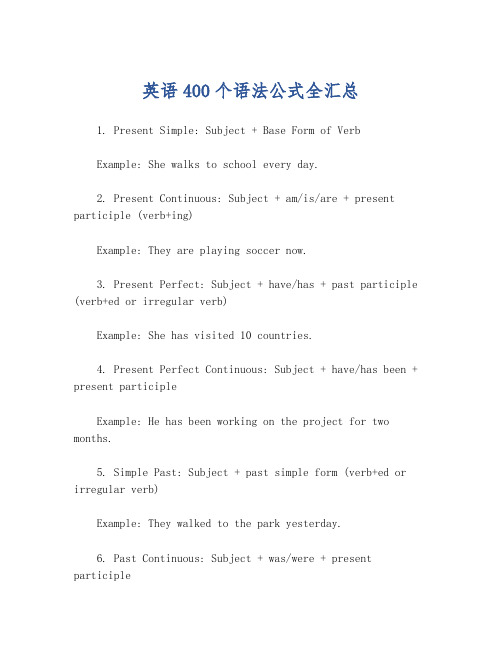
英语400个语法公式全汇总1. Present Simple: Subject + Base Form of VerbExample: She walks to school every day.2. Present Continuous: Subject + am/is/are + present participle (verb+ing)Example: They are playing soccer now.3. Present Perfect: Subject + have/has + past participle (verb+ed or irregular verb)Example: She has visited 10 countries.4. Present Perfect Continuous: Subject + have/has been + present participleExample: He has been working on the project for two months.5. Simple Past: Subject + past simple form (verb+ed or irregular verb)Example: They walked to the park yesterday.6. Past Continuous: Subject + was/were + present participleExample: She was studying when the phone rang.7. Past Perfect: Subject + had + past participleExample: I had finished my homework before the party started.8. Past Perfect Continuous: Subject + had been + present participleExample: She had been waiting for an hour when the bus finally arrived.9. Future Simple: Subject + will + base form of verbExample: We will travel to Japan next year.10. Future Continuous: Subject + will be + present participleExample: They will be playing tennis at 5 PM.11. Future Perfect: Subject + will have + past participleExample: By next month, she will have learned French for three years.12. Future Perfect Continuous: Subject + will have been + present participleExample: He will have been working here for five years by this time next year.13. Modal Verbs: Subject + Modal Verb (can, could, may, might, must, shall, should, will, would) + base form of verbExample: You should exercise regularly to stay healthy.14. Passive Voice: Present Simple Passive - am/is/are + past participleExample: The news is reported daily.15. Present Continuous Passive: am/is/are being + past participleExample: A new road is being built near my house.16. Present Perfect Passive: have/has been + past participleExample: The work has been completed.17. Present Perfect Continuous Passive: have/has been + present participleExample: The house has been being painted for a week.18. Simple Past Passive: was/were + past participleExample: The letter was written by her.19. Past Continuous Passive: was/were being + past participleExample: The cake was being baked when I arrived.20. Past Perfect Passive: had been + past participleExample: The concert had already been sold out.21. Conditional Sentences: If + simple past, will/won't + base form of verbExample: If it rains, we won't go to the beach.22. Second Conditional: If + past simple,would/could/might/should + base form of verbExample: If I were rich, I would travel around the world.23. Third Conditional: If + past perfect, wouldhave/could have/might have + past participleExample: If I had studied harder, I would have passed the exam.24. Indirect (Reported) Speech: Subject +said/reported/thought + that + clause with shifted tensesExample: She said that she was tired.25. Interrogative Sentences: Auxiliary verb or question word + subject + main verbExample: What do you want for dinner?26. Exclamatory Sentences: What/How + adjective/adverb + subject + verbExample: How beautiful the sunset is!27. Imperative Sentences: Base form of verb + (optional) objectExample: Please close the door.28. Tag Questions: Statement + auxiliary verb or 'be' + pronounExample: You're going to the party, aren't you?29. Comparatives: Adjective/adverb + -er or moreExample: She is smarter than her brother.30. Superlatives: Adjective/adverb + -est or mostExample: He is the tallest in his class.31. Infinitives: to + base form of verbExample: She wants to become a doctor.32. Gerunds: verb + -ingExample: Swimming is a good exercise.33. Participles: present participle (verb+ing) or past participle (verb+ed or irregular verb)Example: The boy sitting on the bench is my brother.34. Cleft Sentences: It is/was + the emphasized element + that/who + rest of the sentenceExample: It was John who broke the window.35. Appositives: Noun + , + subject + verb + ...Example: My brother, a doctor, works in a hospital.36. Relative Clauses: Relative pronoun (。
(完整word版)英语语法汇总

英语语法汇总第一章名词一、名词的分类:名词就其词汇意义可分为专有名词和普通名词。
普通名词又可分为可数名词和不可数名词。
专有名词:Beijing Smith the United Nations个体名词:man, expert, factory可数名词集合名词:audience(观众),class, family普通名词:物质名词:water, coal, rice不可数名词抽象名词:surprise, honour, help二、可数名词的复数形式1.一般情况,直接加-s。
port(港口)→ports;technique(技术)—techniques2.以s, x, ch, sh结尾发[s]、[∫]、[t∫]、[dЗ]音的词,加—esbus—buses, box—boxes, bush—bushesbranch—branches,stomach—stomachs(stomach词尾发k,故复数直接加-s)3.辅音字母+ y,变y为i,加-es university—universitiesy前为元音字母,直接加-s boy—boys4.以O结尾加-es hero—heroesO前为元音字母,及部分外来词直接加-szoo—zoos radio—radio piano—pianos photo—photos5.以f或fe结尾,变f或fe为v,再加-es leaf—leaves wife—wives※以下f结尾单词直接加-s belief—beliefs(信念)roof—roofs(屋顶)proof—proofs(证据)safe—safes(保险柜)chief—chiefs(首领)gulf—gulfs(海湾)6.不规则名词man—men, woman—women, foot—feet, tooth—teeth,goose—geese, mouse—mice, child—children, ox—oxen注1:有些可数名词的单复数相同,要根据上下文的意义来确定其单数还是复数,例如:sheep 羊fish 鱼deer 鹿means手段,方法works工厂,作品series系列注2:在些可数名词,只有单数形式,但表示复数意义。
英语语法大全汇总

英语语法大全汇总(一)一、词类(Parts of Speech)名词英文名称The Noun(缩写为n.)表示人或事物的名称冠词英文名称The Artide(缩写为art.)用在名词前帮助说明名词所指的人或事物代词英文名称The Pronoun(缩写为pron)用来代替名词、形容词、数词形容词英文名称The Adjective(缩写为adj.)用来修饰名词,表示人或事物的特征数词英文名称The Numeral(缩写为num.)表示数量或是顺序动词英文名称The Verb(缩写为v.)表示动作或状态副词英文名称The Adverb(缩写为adv.)修饰动词、形容词、其他副词介词英文名称The Preposition(缩写为prep.)表示名词、代词等和句中其他词的关系连词英文名称The Conjunction(缩写为conj.)用来连接词与词、短语与短语、句与句感叹词英文名称The Interjection(缩写为interj.)表示说话时的喜悦、惊讶等情感二、名词(Nouns)1、名词分为专有名词和普通名词专有名词:表示具体的人、事物、地点或机构的专有名称。
专有名词的第一个字母要大写专有名词如果是含有普通名词的短语,则必须使用定冠词the姓氏名如果采用复数形式,则表示该姓氏一家人(复数含义)普通名词:表示某些人、某些事物、某种物质或抽象概念的名称普通名词又可进一步分为四类1)个体名称:表示单个的人和事物House、car、room、apple、fun、picture2)集体名称:表示一群人或一些事物的名称People、family、army、government、group3)物质名词:表示物质或不具备确定形态和大小的个体的物质Fire、steel、air、water、milk4)抽象名词:表示动作、状态、品质或其他抽象概念Labour、health、life、friendship、patience2、名词按其所表现的事物的性质可分为可数名词和不可数名词可数名词(Countable Nouns)是可以用简单的数词进行计数的名词不可数名词(Uncountable Nouns)不可以用简单的数词进行计数的名词抽象名词物质名词和专有名词一般是不可数名词有少数名词即可作可数名词,也可作不可数名词,但含义不同glass 玻璃glass 玻璃杯paper 纸paper 报纸,文件可数名词有单数(the Singular Nunmber)和复数(the Plural Number)两种形式名词的复数形式(The Plural Form Nouns)的部分规则如下:1) 一般情况下,在词尾加-s.2) 以s,sh,ch,x等结尾的词加-es.3) 以辅音字母+y结尾的词变y为i再加-es.4) 名词以-f 或-fe 结尾的,把-f 或-fe 变成-ves.注:英语中有些名词的复数形式是不规则的,需要一一记忆常见的有:man-men、woman-women、foot-feet、tooth-teeth、mouse-mice、ox-oxen、sheep-sheep、dear-dear、fish-fish 英语中有些名词总是以复数形式出现。
18个英语语法汇总

必须掌握的18个英语语法0101人称代词主格:I we you she he it they宾格:me us you her him it them形容词性物主代词:my our your her his its their名词性物主代词:mine ours yours hers his its theirs 02形容词和副词的比较(1)一般在形容词或副词后+erolder,taller,longer,stronger(2)多音节词前+moremore interesting,etc.(3)双写最后一个字母,再+erbigger fatter,etc.(4)把y变i,再+erheavier,earlier(5)不规则变化:well-better,much/many-more,etc. 03可数词的复数形式Most nouns+sabook–booksNouns ending in aconsonant+y-y+iesa story—storiesNouns ending in s,sh,ch or x+esa glass—glassesa watch-watchesNouns ending in o+s or+esa piano—pianosa mango—mangoesNouns ending in for fe-f or fe+vesa knife–knivesa shelf-shelves0204不可数名词(单复数不变)bread,rice,water,juice等。
05缩略形式I’m=I a,you’re=you are,she’s=she is,he’s=he isit’s=it is,who’s=who is,can’t=can not,isn’t=is not等。
06 a/ana book,a peachan egg,an hour0307 Prepositionon,in,in front of,between,next to,near,beside,at,behind. 表示时间:at six o’clock,at Christma s,at breakfaston Monday,on 15th July,On National Dayin the evening,in December,in winter08基数词和序数词one–first,two-second,twenty-twentieth09 some/anyI have some toys in my bedroom. Do you have any brothers or sisters?0410 be动词(1)Basic form:am/are/is(2)肯定和否定句I am(not)from London.My eyes are(not)small.My hair is(not)long.(3)一般疑问句Am I a Chniese?Yes,you are.No,you aren’t.Are they American?Yes,they are.No,they aren’t.Is the cat fat?Yes,it is.No,it isn’t.11 there be结构肯定句There is a…There are…一般疑问句:Is there…?Yes,there is./No,there isn’t. Arethere…?Yes,there are./No,there aren’t.否定句There isn’t….Therearen’t….12祈使句Sit down pleaseDon’t sit down,please.0513现在进行时通常用“now”.形式:be+verb+ingeg:I am(not)doing my homework.You/We/They are(not)reading.He/She/It is(not)eating.动词—ing的形式Most verbs+ing walk—walkingVerbs ending in e-e+ing come—comingShort verbs ending in a vowel+a consonant run–running swim—swimming表示说话时正在进行的动作或现阶段一直在进行的动作。
英语语法重点知识大汇总
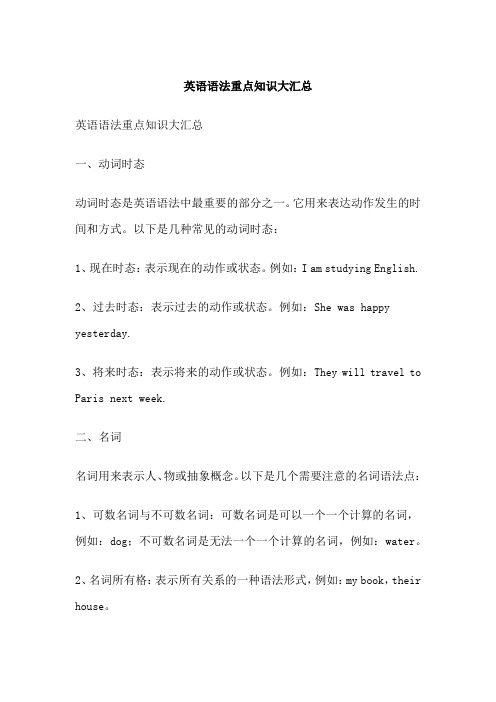
英语语法重点知识大汇总英语语法重点知识大汇总一、动词时态动词时态是英语语法中最重要的部分之一。
它用来表达动作发生的时间和方式。
以下是几种常见的动词时态:1、现在时态:表示现在的动作或状态。
例如:I am studying English.2、过去时态:表示过去的动作或状态。
例如:She was happy yesterday.3、将来时态:表示将来的动作或状态。
例如:They will travel to Paris next week.二、名词名词用来表示人、物或抽象概念。
以下是几个需要注意的名词语法点:1、可数名词与不可数名词:可数名词是可以一个一个计算的名词,例如:dog;不可数名词是无法一个一个计算的名词,例如:water。
2、名词所有格:表示所有关系的一种语法形式,例如:my book,their house。
三、形容词形容词用来描述人或物的特征。
以下是几个需要注意的形容词语法点:1、比较级和最高级:比较级表示“更……”的意思,最高级表示“最……”的意思。
例如:better,best。
2、形容词的位置:形容词一般放在名词前面,如:beautiful flower;但有时候也可以放在名词后面,如:flower beautiful。
四、副词副词用来描述动作或状态的特征。
以下是几个需要注意的副词语法点:1、副词的位置:副词一般放在动词前面,如:quickly run;但有时候也可以放在动词后面,如:run quickly。
2、副词的比较级和最高级:副词也有比较级和最高级,例如:faster,fastest。
五、从句从句是句子中的一个组成部分,它可以是一个完整的句子,也可以是一个短语或单词。
以下是几种常见的从句类型:1、名词性从句:用来代替名词的一种从句,例如:what he said is not important。
2、定语从句:用来修饰名词的一种从句,例如:the girl who is singing is my friend。
400个英语语法公式汇总
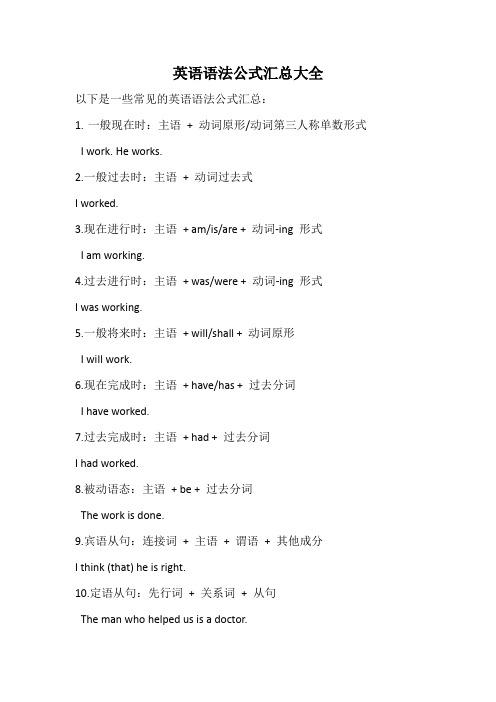
英语语法公式汇总大全
以下是一些常见的英语语法公式汇总:
1.一般现在时:主语+ 动词原形/动词第三人称单数形式
I work. He works.
2.一般过去时:主语+ 动词过去式
I worked.
3.现在进行时:主语+ am/is/are + 动词-ing 形式
I am working.
4.过去进行时:主语+ was/were + 动词-ing 形式
I was working.
5.一般将来时:主语+ will/shall + 动词原形
I will work.
6.现在完成时:主语+ have/has + 过去分词
I have worked.
7.过去完成时:主语+ had + 过去分词
I had worked.
8.被动语态:主语+ be + 过去分词
The work is done.
9.宾语从句:连接词+ 主语+ 谓语+ 其他成分
I think (that) he is right.
10.定语从句:先行词+ 关系词+ 从句
The man who helped us is a doctor.
11.状语从句:连接词+ 从句+ 主句Although he is young, he knows a lot.。
初中英语语法基础学习知识汇总
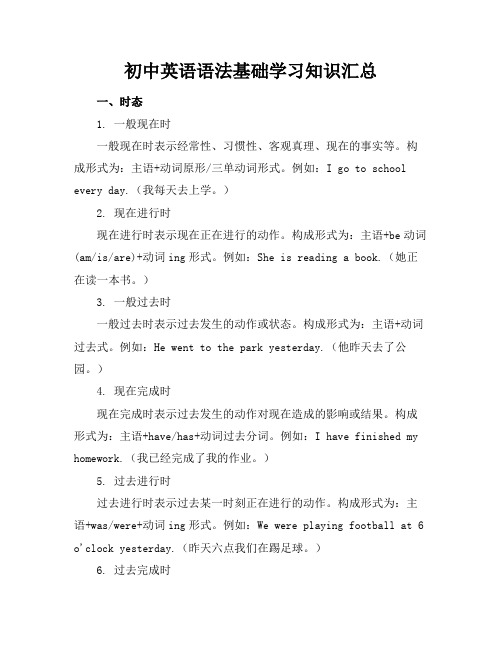
初中英语语法基础学习知识汇总一、时态1. 一般现在时一般现在时表示经常性、习惯性、客观真理、现在的事实等。
构成形式为:主语+动词原形/三单动词形式。
例如:I go to school every day.(我每天去上学。
)2. 现在进行时现在进行时表示现在正在进行的动作。
构成形式为:主语+be动词(am/is/are)+动词ing形式。
例如:She is reading a book.(她正在读一本书。
)3. 一般过去时一般过去时表示过去发生的动作或状态。
构成形式为:主语+动词过去式。
例如:He went to the park yesterday.(他昨天去了公园。
)4. 现在完成时现在完成时表示过去发生的动作对现在造成的影响或结果。
构成形式为:主语+have/has+动词过去分词。
例如:I have finished my homework.(我已经完成了我的作业。
)5. 过去进行时过去进行时表示过去某一时刻正在进行的动作。
构成形式为:主语+was/were+动词ing形式。
例如:We were playing football at 6 o'clock yesterday.(昨天六点我们在踢足球。
)6. 过去完成时过去完成时表示在过去某一时刻之前已经完成的动作。
构成形式为:主语+had+动词过去分词。
例如:She had learned English before she came to China.(她来中国之前已经学过英语了。
)二、被动语态被动语态表示主语是动作的承受者。
构成形式为:be动词(am/is/are/was/were/have/has/had)+过去分词。
例如:The book was written a famous author.(这本书是一位著名作家写的。
)三、情态动词情态动词表示能力、允许、请求、建议等。
常见的情态动词有:can, may, must, should等。
- 1、下载文档前请自行甄别文档内容的完整性,平台不提供额外的编辑、内容补充、找答案等附加服务。
- 2、"仅部分预览"的文档,不可在线预览部分如存在完整性等问题,可反馈申请退款(可完整预览的文档不适用该条件!)。
- 3、如文档侵犯您的权益,请联系客服反馈,我们会尽快为您处理(人工客服工作时间:9:00-18:30)。
英语语法汇总第一章名词一、名词的分类:名词就其词汇意义可分为专有名词和普通名词。
普通名词又可分为可数名词和不可数名词。
专有名词:Beijing Smith the United Nations个体名词:man, expert, factory可数名词集合名词:audience(观众),class, family普通名词:物质名词:water, coal, rice不可数名词抽象名词:surprise, honour, help二、可数名词的复数形式1.一般情况,直接加-s。
port(港口)→ports;technique(技术)—techniques2.以s, x, ch, sh结尾发[s]、[∫]、[t∫]、[dЗ]音的词,加—esbus—buses, box—boxes, bush—bushesbranch—branches,stomach—stomachs(stomach词尾发k,故复数直接加-s)3.辅音字母+ y,变y为i,加-es university—universitiesy前为元音字母,直接加-s boy—boys4.以O结尾加-es hero—heroesO前为元音字母,及部分外来词直接加-szoo—zoos radio—radio piano—pianos photo—photos5.以f或fe结尾,变f或fe为v,再加-es leaf—leaves wife—wives※以下f结尾单词直接加-s belief—beliefs(信念)roof—roofs(屋顶)proof—proofs(证据)safe—safes(保险柜)chief—chiefs(首领)gulf—gulfs(海湾)6.不规则名词man—men, woman—women, foot—feet, tooth—teeth,goose—geese, mouse—mice, child—children, ox—oxen注1:有些可数名词的单复数相同,要根据上下文的意义来确定其单数还是复数,例如:sheep 羊fish 鱼deer 鹿means手段,方法works工厂,作品series系列注2:在些可数名词,只有单数形式,但表示复数意义。
如果作主语,谓语动词用复数形式。
如:cattle 牛people 人民police 警察注3:集合名词既可看作单数(作为整体),也可看作复数(作为集体的各个成员)。
例如:audience (观众)class(班级)family(家庭)group(小组)Her family is well-known in the region. 她家在该地区是名门望族。
His family are quarrelling severely about the property.她的家人正在为分财产激烈地争吵。
改错:1. Every possible means have been tried to cure the boy of his illness.A B C D2. Fish always sells well in the markets because fish contains rich protein, which can build you up.英语语法汇总A B C D3. Is it the police who is searching the house for a wanted criminal(罪犯)?A B C D三、不可数名词物质名词、抽象名词均属不可数名词。
前面不能加不定冠词a / an,词尾也不能加—s。
请牢记下列典型的不可数名词。
news 消息information 信息advice 忠告,建议progress 进步,进展knowledge 知识weather天气fun 乐趣equipment 设备English 英语furniture 家具wealth 财富damage 损坏traffic 交通,车辆及行人baggage / luggage 行李clothing 衣服,衣着※word 消息,信息work 工作homework 家庭作业housework 家务改错:1.What a fun it is to be bathed in sunlight on the beach in summer.A B C D2.At the thought of gaining such great wealths by printing works of famous writers, he was full of joyA B C D3.What pleasant surprise it is to bring me such a nice gift !A B C D4.I feel it great honour to be invited to give advice on your teaching papers.A B C D5.Word of his sudden death came as shock to us.A B C D说明1:部分抽象名词可与a(an)连用,此时词义发生变化,表示某种事或人。
这些词有:surprise, pleasure, shock, honour, help, success等。
当这类词在句中作表语(例3),作宾补(例4)及在介词as之后,词义发生变化,通常要加a / an。
说明2:paper表示“纸”不可数。
表示“报纸、论文、书面作文、试卷、文件、有价证券”为可数名词。
四、名词的所有格名词的所有格通常在名词后加—’s构成,用于表示所属关系。
用于以下情况:1)表示有生命的名词my brother’s car children’s books(儿童读物)students’ rooms2)表示国家、城市、地域的名词C hina’s population Beijing’s weather3)表示天体、时间、距离、金钱的名词the moon’s surface ten years’ hard work十年的辛劳today’s newspapers 20 dollars’ worth of a stamp 一张价值20美元的邮票其他无生命的名词通常用“of + 名词”的短语表示所属关系。
the object of the sentence 句子的宾语the title of the film 影片的名字五、名词的作用1)名词在句中可作主语、宾语、表语、宾语补足语。
Mr. Li holds an important position in the government office.英语语法汇总主语宾语We elected him monitor of our class.宾语宾补2)名词还作其他名词的前置定语,用于更准确说明某物的用途,性质,组成材料等。
a tea cup 茶杯 a car number 车牌号 a shoe shop 鞋店 a stone bridge 石桥※※名词作定语必须用单数。
man, woman作定语,用单数还是复数由被修饰的名词的单复数决定。
sport作定语,单复数形式均可。
a man teacher 一个男教师ten women doctors 十个女医生a sport(s)shirt 运动衫the arms race 武器竞赛(特例)选:It is said that the Air Force about $80 million a year. Really a problem, isn’t it ?A.bird hit cost B.birds hit costs C.bird hits cost D.bird hit costs 本题题义:空军每年因飞鸟撞击飞机造成的损失达大约八千万美元。
考查的是名词作定语。
名词作定语必须用单数,故可考虑的答案为A、C。
又因一年内鸟击飞机事件多次发生,故选C。
六、学习名词,特别要注意的问题1)准确把握词义,重视近义词的辩析选:One of the advantage of living on the top floor of a high rise is that you can get a good .(2001年上海高考题)A.sight B.scene C.view D.look辩析:sight 1.看见 2.视力 3.视野 4.风景scene 1.(事件发生的)现场2.场面; 情景3.景色4.(拍电影)场景,(舞台)布置view 1.眺望2.视野3.风景,景色。
look 1.看 2.神色,表情looks =appearance外貌本句意为:住在高层建筑顶层的优越之一,是能清楚眺望到一切。
故本题答案为C。
近年来高考试卷非常重视对名词的考查,是重点热点之一。
2)正确掌握名词前冠词的使用规则选:1. Summer in ________ south of France are for ________ most part dry and sunny.A. /; aB. the, /C. /, /D. the, the2.Most animals have little connection with animals of different kind unless they kill them for food.A.the ;a B.不填;a C.the ;the D.不填;the名词练习1.He is a man of ________ and he has_______ interesting_______ in his life.A. much experience; a lot of; experiencesB. many experiences; much; experienceC. many experience; much; experienceD. many experiences; a lot of; experience2.Perhaps we need to clear away these books to make _______ for our new students.A. placeB. areaC. roomD. space3.If you are driving to the airport, can you give me a _______?A. handB. seatC. driveD. lift4.Being able to speak another language fluently is a great ______ when you are looking for a job.A. chanceB. importanceC. assistantD. advantage5.The _______ of building the Great Theater ______ only one year.A. job; spentB. work; spentC. position, tookD. works, took英语语法汇总6.He had run away from home and gone to _______ when he was 16 years old.A. the seaB. a seaC. seasD. sea7.Only one third of the people present at the meeting were _________ the new rules.A. in favour ofB. in agreement ofC. in forD. wit the side of8.Everybody thinks little of the film. In fact, there is no ______ of it being tried out in the filmfestival.A. signB. useC. possibilityD. doubt9.Can your ________ with you---- money , jewellery, cameras and so on.A. giftsB. suitcaseC. bagsD. valuables10.Students should be encouraged to finish their homework_______.A. of themselvesB. of their ownC. for their ownD. on their own11.When he is angry, his _______ stands up on end.A. headB. uniformC. hairD. skin12.His letter was so confusing that I could hardly make any ______ of it.A. explanationB. meaningC. senseD. guess13.---Is Mr Smith in? --- No, he’s asked for _______ leave.A. a two week’sB. a two-weekC. a two-week’sD. a two weeks14.-----______ car crashed into a tree yesterday. They must have been driving too fast.---- Every boy and every girl _____ to drive that fast.A. Tom and Jane’s; wishB. Tom’s and Jane’s ;wishesC. Tom and Jane’s ; likesD. Tom’s and Jane’s ; want15.________ Mr Wang has! He almost never remembers where he leaves his keys.A. What a poor memoryB. What poor memoryC. How good a memoryD. How poor memory16.The _____ change of weather may have some _____ his health.A. sudden; causedB. sudden; effect onC. suddenly; bad results toD. suddenly; effect on17.Because prices of food and clothing and almost everything else in that country have steadilygone up the buying _______ of the dollar has gone down.A. energyB. forceC. powerD. strength18._______ of English is helpful if you are devoted to _______ English literature.A. A good knowledge; studyB. A good knowledge ; studyingC. Good knowledge; studyD. Good knowledge; studying19.---Few children are as bright as he is, and also, he works very hard.--- It’s no _______ that he always gets the first place in any examination.A. doubtB. problemC. questionD. wonder20.Mary’s handwriting is better than_______ in her class.A. anyone elseB. anyone else’sC. anyone’s elseD. other students21.It really doesn’t make any _____ whether to buy a laptop computer or a desktop computer.A. choiceB. decisionC. differenceD. sense22.Many students signed up for the _____ race in the sports meeting to be held next week.A. 800-meter-longB. 800-meters-longC. 800 meter lengthD. 800 meters length23.His behaviour at the party last night seemed rather______. Many of us were quite surprised.英语语法汇总A. out of practiceB. out of placeC. out of politenessD. out of pity24.These football players had no strict ______ until they joined our club.A. practiceB. educationC. trainingD. exercise25.If it was not an accident, he must have done it ________.A. on purposeB. in commonC. on occasionD. in time26.We must keep our room clean. Dirt and disease go _______.A. from time to timeB. hand in handC. step by stepD. one after another27._____ is known to us all, _____ feed on grass while horses on grain.A. It , cattleB. This; cattlesC. What ; cattlesD. As; cattle28.______ everyone can hear the speaker there is no______ in turning up the radio.A. Now that; pointB. Even if; pointC. Now that, needD. Even if; need29.Shelly had prepared carefully for her English examination so that she could be sure of passing iton her first _______.A. intentionB. attemptC. purposeD. desire30.No one has yet succeeded in explaining the ______ of how life began.A. causeB. problemC. reasonD. puzzle31.Jack tried hard to get a gold medal in this Winter Olympic Games but he had no ______.A. luckB. timeC. fateD. entrance32.The young man owes his success to many people , his parents _______.A. after allB. by chanceC. on purposeD. in particular33.I should like to try that coat on, for I don’t know if it is my _______.A. shapeB. modelC. designD. size34.It is important for us to employ a word or phrase to the _______ in language studies.A. situationB. expressionC. conditionD. translation35.Flight BA 123 to Vienna is now boarding at _______.A. Gate 21B. 21st GateC. the Gate 21D. 21 Gate36.----Shall we take a walk before dinner?----- Oh, yes, ______ is my favourite time of a day.A. the early eveningsB. in the early eveningC. the early of the eveningD. early evening37.Being poor, she had to borrow a new _______ so as to attend the party.A. clothB. clothesC. clothingD. dress38.Popular music is liked by many people, but it is not to everyone’s _______.A. mannersB. smellC. tasteD. thought39.Such good ______ should be made of one’s spare time to study another foreign language. A.chance B. choice C. decision D. use40.She thought the painting was of little ______ , so she let him have it for only $15.A. costB. importantC. priceD. value41.There are three _______ in our clinic.A. woman doctorB. woman doctorsC. women doctorD. women doctors42.I tried every ______ to make him give up smoking.A. meanB. waysC. meaningD. means43.______ will conquer nature.英语语法汇总A. The manB. ManC. Any manD. The men44.Yesterday I was invited to the dinner at _______.A. TurnersB. the TurnersC. Turners’D. the Turners’45.Jess went to a _______ for some shoes.A. shoes’ storeB. shoe storeC. shoe’s storeD. shoes store46.Standing on top of the mountain, you’ll get a wonderful _______.A. joyB. seeingC. viewD. nature47.He was chosen _____ of the company.A. managerB. a managerC. the managerD. as a manager48.---What can I do for you? --- I’d like to have a ______ of China Daily.A. pieceB. sheetC. lotD. copy49.______it is to listen to music!A. How funB. How a funC. What a funD. What fun50.What the expert has said and done will be _______ to the department managers.A. valueB. benefitC. of valuableD. of benefit1-5 ACDDD 6-10 DACDD 11-15 CCBCA 16-20 BCBDB 21-25 CABCA 26-30 BDABA 31-35 ADDAA 36-40 DDCDD 41-45 DDBDB 6-50 CADDD第二章主谓一致句子的谓语动词和句子的主语应在数方面保持一致。
